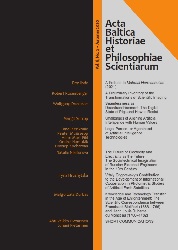The Future of Electricity and Electricity as the Future: The Sociotechnical Imagination of Russian Electrical Engineers in the 19th Century
The Future of Electricity and Electricity as the Future: The Sociotechnical Imagination of Russian Electrical Engineers in the 19th Century
Author(s): Natalia NikiforovaSubject(s): Social Philosophy, Philosophy of Science, Social development, 19th Century
Published by: Tallinna Tehnikaülikooli õiguse instituut
Keywords: electrical engineering; electricity; future; science fiction; sociotechnical imaginaries; temporality;
Summary/Abstract: This article examines Russian engineers’ social imagination about the future through the professional discussions held at the electrotechnical congresses in the nineteenth century. Formulating the prospective future of the industry, the state and society was a collective endeavor, a process in which the identity and mission of engineers were crystallized. Through envisioning the future of technology and its role in the society, engineers revealed their cultural role as mediators between technological innovation, and both the wider public and the state. In order to better understand the manifestations of the shared cultural understandings of a desirable future and social order, the article resorts to Sheila Jasanoff’s concept of sociotechnical imaginaries (Jasanoff & Kim, 2015). The engineering community’s sociotechnical imagination about electricity was shaped around the transformative possibilities of this technology. It was believed that electrical engineering was able not only to accelerate industrial production, but also to solve social, medical and cultural problems, thereby uniting the Russian Empire. Descriptions of the rational, comfortable and beautiful world of the electrified future overlapped in engineering discussions, journalism and science fiction. Positive scenarios emphasized the advantages of electrical engineering and bypassed the problems associated with electrification, constructing an idea of its inevitability. The electrical engineer became a kind of a new cultural hero, who knew how to make a working device or system, and also filled the task of linking the development of technology to the development of society.
Journal: Acta Baltica Historiae et Philosophiae Scientiarum
- Issue Year: 8/2020
- Issue No: 2
- Page Range: 93-114
- Page Count: 22
- Language: English

